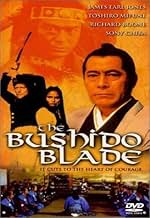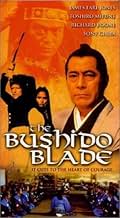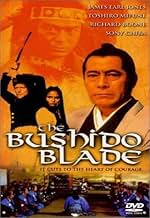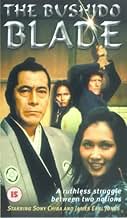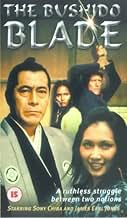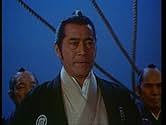VALUTAZIONE IMDb
5,3/10
467
LA TUA VALUTAZIONE
Aggiungi una trama nella tua linguaA steel samurai blade that was to be given to the American ambassador by the Emperor of Japan is stolen. American sailors and Japanese samurai are sent to find it.A steel samurai blade that was to be given to the American ambassador by the Emperor of Japan is stolen. American sailors and Japanese samurai are sent to find it.A steel samurai blade that was to be given to the American ambassador by the Emperor of Japan is stolen. American sailors and Japanese samurai are sent to find it.
Mike Starr
- Bos'n Cave Johnson
- (as Michael Starr)
Timothy Patrick Murphy
- Midshipman Robin Burr
- (as Timothy Murphy)
Shin'ichi Chiba
- Prince Ido
- (as Sony Chiba)
Hitoshi Ômae
- Sumo
- (as Kin Omai)
Recensioni in evidenza
Great cast. Too bad the rest of it couldn't match up.
Richard Boone plays a growling Cmmdr. Perry in his last role. And REALLY chews it up.
Frank (Coronet Blue) Converse (The real star) attempts to be an action hero. Not enough action though. And He's a little wooden.
Any Asian actor with a name dropped by for a cameo. Seeing the late, great Toshiro Mifune reprise most of his previous samurai roles was nice. And Sonny Chiba's warrior cliché is something I never get tired of. Then there's Mako as the cliché' wise man.
Laura (GODDESS) Gemser showing up made it worth the price of a rental. (To me anyway. She is GORGEOUS.) Seeing a young Mike Starr was kind of cool. He was obviously meant to be comedy relief.
James Earl Jones role should have been larger. Is this film still cut? An adventure story about finding a stolen sword could have and should have been a lot better.
And that minstrel show on the ship might anger a few people...even if it is based on facts of the times.
Not a waste...not unmissable either.
Richard Boone plays a growling Cmmdr. Perry in his last role. And REALLY chews it up.
Frank (Coronet Blue) Converse (The real star) attempts to be an action hero. Not enough action though. And He's a little wooden.
Any Asian actor with a name dropped by for a cameo. Seeing the late, great Toshiro Mifune reprise most of his previous samurai roles was nice. And Sonny Chiba's warrior cliché is something I never get tired of. Then there's Mako as the cliché' wise man.
Laura (GODDESS) Gemser showing up made it worth the price of a rental. (To me anyway. She is GORGEOUS.) Seeing a young Mike Starr was kind of cool. He was obviously meant to be comedy relief.
James Earl Jones role should have been larger. Is this film still cut? An adventure story about finding a stolen sword could have and should have been a lot better.
And that minstrel show on the ship might anger a few people...even if it is based on facts of the times.
Not a waste...not unmissable either.
It's always a little fascinating when a filmmaker undertakes a production at least partly outside their own country, and at least partly in another language. I would love the chance to read all about international co-productions like this, and learn how they came into being. What makes this instance particularly interesting, for good or maybe mostly for ill, is the ultimate form that it took, which is plainly evident very early on. Japanese filmmaker Kotani Tsugunobu may be directing (credited as "Tom Kotani"), and much of the picture may have been filmed in Japan with the cooperation of Toho. Why, much of the cast and crew is Japanese, including icons Mifune Toshiro and Sonny Chiba. Yet between the involvement of famed U. S. producers Rankin/Bass, and the screenplay of U. S. writer William Overgard, far more than not 'The bushido blade' absolutely feels from top to bottom like an exclusively Hollywood affair, and often in the worst of ways. This doesn't mean that it's not enjoyable - it is, to one degree or another - but the sincerity of it all is very much in question, and I'm also curious just how the contributors viewed their participation in retrospect.
Let's not beat around the bush: this does not treat Japan, its culture, or its people well. At best the feature offers a hopelessly simplified interpretation and depiction, and at worse the ignorant racism and jingoism of the nineteenth-century American characters is extended to the sensibilities with which the Japanese are portrayed. The Americans are roundly arrogant, with a conflated sense of self, virtue, and superiority; even when the script doesn't have the Americans specifically looking down on Japan as a backwards, quaint nation of "savages," the Americans are made out to be the definite heroes, and the Japanese to be the definite villains. And the thing is, despite the premise, there actually isn't a lot of room for nuance in this flick, for the characterizations are reduced and heavy-handed, if not purely archetypal or stereotypical - and the plot isn't far behind. One boyish, kindhearted sailor happens to have studied the language; his beefy uncle is much more physical and oafish; their designated leader will quizzically be dubbed an honorary samurai after being on Japanese soil for all of one day. One Japanese woman is soft and demure; one (played by Indonesian-Dutch actress Laura Gemser) is more dubious yet as she is The Fiery Warrior, The Warrior Poet, The Soft Woman, and The Romantic Interest all rolled into one.
I can forgive the very ahistorical story appended to a reimagined rendition of Commodore Perry arriving in Japan in the 1850s. I'm more concerned about the characters that fill discrete narrative roles, but without any hint of depth or nuance. I'm more concerned about how the scene writing flimsily tosses in sundry odds and ends that emphatically say "Japan!" for those viewers whose only experience with the Land of the Rising Sun is what they've seen or heard poorly represented on television: samurai, a violent code of honor, a long history of isolation, earthquakes. I'm certainly more concerned about how the plot at large seems rather loose, defined more by (a) some small set number of essential beats, and otherwise (b) general vibes, more than cogency, cohesiveness, or a mind for impactful drama or thrills. And I'm concerned by how even beyond conception and conjuration, the execution of this flick is wanting. Save for some nudity and greater levels of violence, this often comes across like the sort of highfalutin, "pip pip!" live-action adventure fare that Disney churned out in previous years. This sense comes from the writing, certainly, but also from the decided lack of polish in too many action sequences, as if professional stunt coordinators and fight choreographers weren't a thing. (At least "dueling master" Kuze Ryu shows that his involvement was not for nothing.) Sometimes it almost feels like Kotani was director in name only, and some unnamed American counterpart was actually in charge to see that all possible clichés and empty, tiresome tropes made their way in.
Sure, the filming locations are beautiful. The costume design is pretty sharp, and the production design and art direction. Some of the stunts and effects are better than others. It's reasonably well made. The movie is still entertaining to some extent, and I don't regret watching. But this needed so badly to be written and made more carefully, with more input from Kotani and Toho, and with less from Rankin/Bass. I don't know where precisely the responsibility lies for how this turned out, but I really have to wonder just how everyone felt about it when all was said and done as a title that frankly does a disservice to Japan and which in no meaningful way evinces anything except Hollywood with its all too common misrepresentations of This or That. Chiba is wasted here, and Mifune even more so; the same could surely be said for other stars. 'The bushido blade' is okay if you happen to come across it, but even if you're a huge fan of someone involved, there's no major reason to check it except as something light to pass the time on a quiet day. Maybe that's all it needed to be, but I expected something more solid and sure-footed.
Let's not beat around the bush: this does not treat Japan, its culture, or its people well. At best the feature offers a hopelessly simplified interpretation and depiction, and at worse the ignorant racism and jingoism of the nineteenth-century American characters is extended to the sensibilities with which the Japanese are portrayed. The Americans are roundly arrogant, with a conflated sense of self, virtue, and superiority; even when the script doesn't have the Americans specifically looking down on Japan as a backwards, quaint nation of "savages," the Americans are made out to be the definite heroes, and the Japanese to be the definite villains. And the thing is, despite the premise, there actually isn't a lot of room for nuance in this flick, for the characterizations are reduced and heavy-handed, if not purely archetypal or stereotypical - and the plot isn't far behind. One boyish, kindhearted sailor happens to have studied the language; his beefy uncle is much more physical and oafish; their designated leader will quizzically be dubbed an honorary samurai after being on Japanese soil for all of one day. One Japanese woman is soft and demure; one (played by Indonesian-Dutch actress Laura Gemser) is more dubious yet as she is The Fiery Warrior, The Warrior Poet, The Soft Woman, and The Romantic Interest all rolled into one.
I can forgive the very ahistorical story appended to a reimagined rendition of Commodore Perry arriving in Japan in the 1850s. I'm more concerned about the characters that fill discrete narrative roles, but without any hint of depth or nuance. I'm more concerned about how the scene writing flimsily tosses in sundry odds and ends that emphatically say "Japan!" for those viewers whose only experience with the Land of the Rising Sun is what they've seen or heard poorly represented on television: samurai, a violent code of honor, a long history of isolation, earthquakes. I'm certainly more concerned about how the plot at large seems rather loose, defined more by (a) some small set number of essential beats, and otherwise (b) general vibes, more than cogency, cohesiveness, or a mind for impactful drama or thrills. And I'm concerned by how even beyond conception and conjuration, the execution of this flick is wanting. Save for some nudity and greater levels of violence, this often comes across like the sort of highfalutin, "pip pip!" live-action adventure fare that Disney churned out in previous years. This sense comes from the writing, certainly, but also from the decided lack of polish in too many action sequences, as if professional stunt coordinators and fight choreographers weren't a thing. (At least "dueling master" Kuze Ryu shows that his involvement was not for nothing.) Sometimes it almost feels like Kotani was director in name only, and some unnamed American counterpart was actually in charge to see that all possible clichés and empty, tiresome tropes made their way in.
Sure, the filming locations are beautiful. The costume design is pretty sharp, and the production design and art direction. Some of the stunts and effects are better than others. It's reasonably well made. The movie is still entertaining to some extent, and I don't regret watching. But this needed so badly to be written and made more carefully, with more input from Kotani and Toho, and with less from Rankin/Bass. I don't know where precisely the responsibility lies for how this turned out, but I really have to wonder just how everyone felt about it when all was said and done as a title that frankly does a disservice to Japan and which in no meaningful way evinces anything except Hollywood with its all too common misrepresentations of This or That. Chiba is wasted here, and Mifune even more so; the same could surely be said for other stars. 'The bushido blade' is okay if you happen to come across it, but even if you're a huge fan of someone involved, there's no major reason to check it except as something light to pass the time on a quiet day. Maybe that's all it needed to be, but I expected something more solid and sure-footed.
Way back in 1980, I saw "The Bushido Blade" as a late night premiere on CBS. Much younger then, I was fairly impressed with the romance and action and the film was fondly remembered over the decades.
25 years later, the film comes out in DVD and I had to get it.
Well...
My disappointment was palpable. Richard Boone gives a loud, obnoxious performance as Commodore Matthew Perry, top billed James Earl Jones, while in fine voice and shape, only appears for about 2 minutes of screen time. The rugged Frank Converse comes off fairly well, but I can't understand why a Japanese actress was not cast as Tomoe instead of Laura Gemser. Sonny Chiba and Mako make good impressions, but something's not right when Mayumi Asano, playing Yuki, gives the best performance in the film. And this, with virtually no dialog. But, perhaps, that explains it right there.
Poorly written by William Overgard, a Rankin-Bass in-house hack, the story, beginning with an offensive minstrel show, is about the search by American sailors for a stolen ceremonial samurai sword, meant as a gift for the President of the United States in 1854 Japan. The three Americans are aided in their search by noble samurai Chiba and half-caste warrior Gemser. What bothers me most is the lack of any texture in the story. Most scenes take place against utilitarian sets with no detail. The countryside, where most of what passes as action takes place, is flatly filmed. Worst of all, none of the local Japanese have any significant dialog, and surprisingly, have no involvement in the story, but, act only as background color for the three or four major characters. Very strange. I think there are less than 10 speaking roles and half of those are of the "Yes, Sir. No, Sir" variety from extras.
After some disappointing samurai battle action over the sword against a lord and his poorly trained army of warriors...it just ends. You might be surprised by the suddenness of the fade out, but, that's all there is. I understand there is an alternate version running about 10 minutes longer, but, besides an extended ending, I can't imagine what might be missing or added to improve things. In retrospect, viewing the film after so many years brought back certain story reservations I had even as a youngster. Plot holes abound and the final fate of the sword and it's pursuers is not ironic as intended, but just leaves a bad taste in your mouth.
25 years later, the film comes out in DVD and I had to get it.
Well...
My disappointment was palpable. Richard Boone gives a loud, obnoxious performance as Commodore Matthew Perry, top billed James Earl Jones, while in fine voice and shape, only appears for about 2 minutes of screen time. The rugged Frank Converse comes off fairly well, but I can't understand why a Japanese actress was not cast as Tomoe instead of Laura Gemser. Sonny Chiba and Mako make good impressions, but something's not right when Mayumi Asano, playing Yuki, gives the best performance in the film. And this, with virtually no dialog. But, perhaps, that explains it right there.
Poorly written by William Overgard, a Rankin-Bass in-house hack, the story, beginning with an offensive minstrel show, is about the search by American sailors for a stolen ceremonial samurai sword, meant as a gift for the President of the United States in 1854 Japan. The three Americans are aided in their search by noble samurai Chiba and half-caste warrior Gemser. What bothers me most is the lack of any texture in the story. Most scenes take place against utilitarian sets with no detail. The countryside, where most of what passes as action takes place, is flatly filmed. Worst of all, none of the local Japanese have any significant dialog, and surprisingly, have no involvement in the story, but, act only as background color for the three or four major characters. Very strange. I think there are less than 10 speaking roles and half of those are of the "Yes, Sir. No, Sir" variety from extras.
After some disappointing samurai battle action over the sword against a lord and his poorly trained army of warriors...it just ends. You might be surprised by the suddenness of the fade out, but, that's all there is. I understand there is an alternate version running about 10 minutes longer, but, besides an extended ending, I can't imagine what might be missing or added to improve things. In retrospect, viewing the film after so many years brought back certain story reservations I had even as a youngster. Plot holes abound and the final fate of the sword and it's pursuers is not ironic as intended, but just leaves a bad taste in your mouth.
I read the premise on the back of the case and thought Bushido Blade would be a great movie. Granted, I knew movies about Japan made in years past could be somewhat contrived, but the description made it sound like a good adventure story in an interesting setting.
Unfortunately, this turned out to be less than that. While always entertaining, everything was a little gratuitous, a little forced, a little affected. The only particularly likable characters were Mifune's, Mako's and Chiba's, and the whole thing sort of just deflated as it went along.
Furthermore, I found myself laughing out loud at the particularly violent moments. Half of it was just at how intense they were, but a lot (if not most) of it was how unintentionally funny they were.
This leaves a lot to be desired. It's not bad by any means, but it has none of the magic that Mifune's other movies do.
Unfortunately, this turned out to be less than that. While always entertaining, everything was a little gratuitous, a little forced, a little affected. The only particularly likable characters were Mifune's, Mako's and Chiba's, and the whole thing sort of just deflated as it went along.
Furthermore, I found myself laughing out loud at the particularly violent moments. Half of it was just at how intense they were, but a lot (if not most) of it was how unintentionally funny they were.
This leaves a lot to be desired. It's not bad by any means, but it has none of the magic that Mifune's other movies do.
A co-production between Japan and U.S. company Rankin/Bass, THE BUSHIDO BLADE (1979) was an attempt to capitalize on a growing interest in Japanese history which culminated the following year in the successful 'Shogun' TV miniseries and the English-dubbed samurai film, SHOGUN ASSASSIN, a re-edit of two films from the Japanese 'Lone Wolf and Cub' series. THE BUSHIDO BLADE, however, was the wrong film at the right time, despite the fact that it was shot in Japan with a mixed cast of American actors and Japanese stars. A fanciful account of Americans in Japan in 1854, it was ultimately undone by its low budget, lack of excitement, and contrived script.
It's set at the time of Commodore Matthew C. Perry's second trip to Japan, in February 1854, and his attempt to get a signed treaty with the Shogun. The basic plot borrows more than a little from the 1972 samurai western, RED SUN, and has to do with the theft of a sword intended for the U.S. president by a Japanese faction opposed to the treaty. Acting without orders, three Americans--a marine captain and two sailors, one of whom speaks a little Japanese--go off in pursuit of the sword and have numerous encounters in the Japanese countryside before the big confrontation at the castle of Lord Yamato, the nobleman behind the theft of the blade.
Quite improbably, the Americans encounter more than a few Japanese--five in all--who happen to speak adequate English, one of whom, Enjiro (played by Japanese-American actor Mako), is based on an actual historical figure, the fisherman Manjiro, who had been shipwrecked and taken to America some years earlier, but who actually had no interaction with the Americans during Perry's second trip. The other Japanese characters are all rather unlikely candidates to be proficient English speakers in 1854 Japan, but they include some big name actors. Toshiro Mifune (YOJIMBO) plays the Shogun's Commander; Sonny Chiba (THE STREET FIGHTER) plays Prince Ido, a foe of Yamato; and Tetsuro Tamba (YOU ONLY LIVE TWICE) plays Lord Yamato. Laura Gemser seems to have wandered in from Italian exploitation films (the EMANUELLE series) to play a half-Japanese, half-'foreign' English-speaking female samurai who beds the American captain.
The only big names in the American cast are Richard Boone, a one-time TV star ('Have Gun, Will Travel') and character actor in his final film role (as Commodore Perry), and James Earl Jones, who has a cameo as a shipwrecked sailor who's been held by the Japanese for two years. The biggest American part, Captain Hawk, is played by Frank Converse, primarily a TV actor ('NYPD'), who is actually quite good at portraying America's particular 19th century brand of arrogance and self-importance. Timothy Murphy plays the young American lieutenant who becomes enamored of Japanese culture (and falls for a Japanese woman). Mike Starr, later a prominent character actor and comic player (GOODFELLAS, ED WOOD, DUMB AND DUMBER), appears in his first film as burly sailor Cave Johnson, who takes on a sumo wrestler in one of the film's comic sidebars.
Overall, the film is of interest to Japan buffs and samurai fans, but it's bound to be a disappointment to most others because of its hackneyed story, stilted direction and TV-movie style of shooting. The film got very little theatrical release in the U.S. and went straight to television in most areas.
It's set at the time of Commodore Matthew C. Perry's second trip to Japan, in February 1854, and his attempt to get a signed treaty with the Shogun. The basic plot borrows more than a little from the 1972 samurai western, RED SUN, and has to do with the theft of a sword intended for the U.S. president by a Japanese faction opposed to the treaty. Acting without orders, three Americans--a marine captain and two sailors, one of whom speaks a little Japanese--go off in pursuit of the sword and have numerous encounters in the Japanese countryside before the big confrontation at the castle of Lord Yamato, the nobleman behind the theft of the blade.
Quite improbably, the Americans encounter more than a few Japanese--five in all--who happen to speak adequate English, one of whom, Enjiro (played by Japanese-American actor Mako), is based on an actual historical figure, the fisherman Manjiro, who had been shipwrecked and taken to America some years earlier, but who actually had no interaction with the Americans during Perry's second trip. The other Japanese characters are all rather unlikely candidates to be proficient English speakers in 1854 Japan, but they include some big name actors. Toshiro Mifune (YOJIMBO) plays the Shogun's Commander; Sonny Chiba (THE STREET FIGHTER) plays Prince Ido, a foe of Yamato; and Tetsuro Tamba (YOU ONLY LIVE TWICE) plays Lord Yamato. Laura Gemser seems to have wandered in from Italian exploitation films (the EMANUELLE series) to play a half-Japanese, half-'foreign' English-speaking female samurai who beds the American captain.
The only big names in the American cast are Richard Boone, a one-time TV star ('Have Gun, Will Travel') and character actor in his final film role (as Commodore Perry), and James Earl Jones, who has a cameo as a shipwrecked sailor who's been held by the Japanese for two years. The biggest American part, Captain Hawk, is played by Frank Converse, primarily a TV actor ('NYPD'), who is actually quite good at portraying America's particular 19th century brand of arrogance and self-importance. Timothy Murphy plays the young American lieutenant who becomes enamored of Japanese culture (and falls for a Japanese woman). Mike Starr, later a prominent character actor and comic player (GOODFELLAS, ED WOOD, DUMB AND DUMBER), appears in his first film as burly sailor Cave Johnson, who takes on a sumo wrestler in one of the film's comic sidebars.
Overall, the film is of interest to Japan buffs and samurai fans, but it's bound to be a disappointment to most others because of its hackneyed story, stilted direction and TV-movie style of shooting. The film got very little theatrical release in the U.S. and went straight to television in most areas.
Lo sapevi?
- QuizAlthough this film was derided as an attempt to copy the hit TV mini-series Shogun (1980), it was actually made in 1978, before Shogun (1980), though it wasn't released until after that series had aired.
- Curiosità sui creditiThe producers gratefully acknowledge the cooperation of Toho Studios staff and personnel in the production of this picture.
- Versioni alternativeFirst shown in USA in a 92-minute version on cable television, prior to a theatrical release in the USA of the complete 104-minute version, this retitled "The Bloody Bushido Blade."
- ConnessioniFeatured in Vintage Video: 0249 The Bushido Blade (1981) (2021)
I più visti
Accedi per valutare e creare un elenco di titoli salvati per ottenere consigli personalizzati
- How long is The Bushido Blade?Powered by Alexa
Dettagli
- Data di uscita
- Paesi di origine
- Lingue
- Celebre anche come
- The Bloody Bushido Blade
- Luoghi delle riprese
- Aziende produttrici
- Vedi altri crediti dell’azienda su IMDbPro
Contribuisci a questa pagina
Suggerisci una modifica o aggiungi i contenuti mancanti



